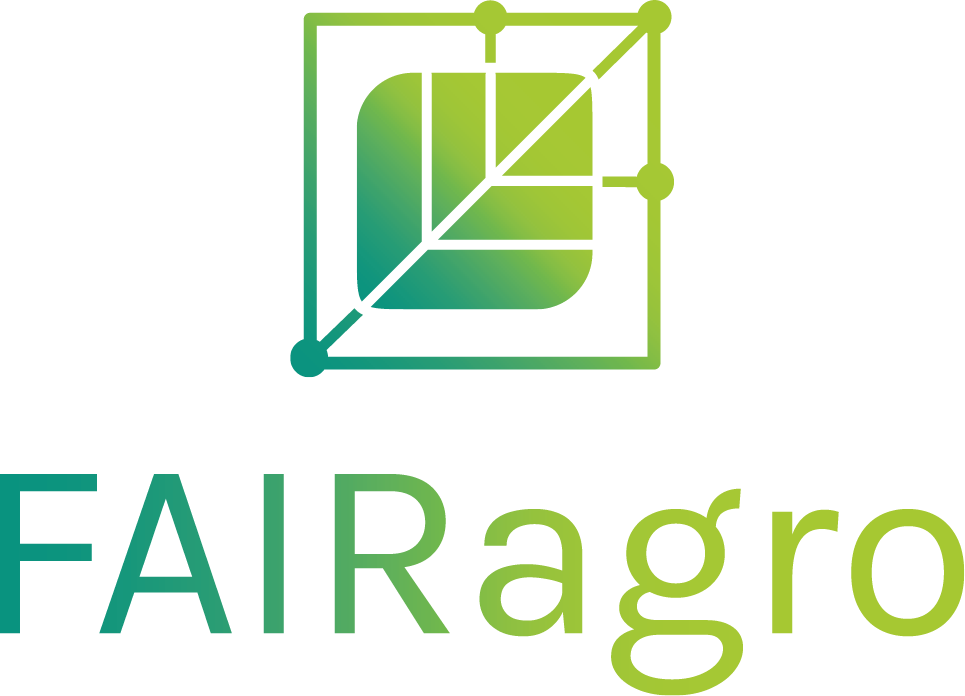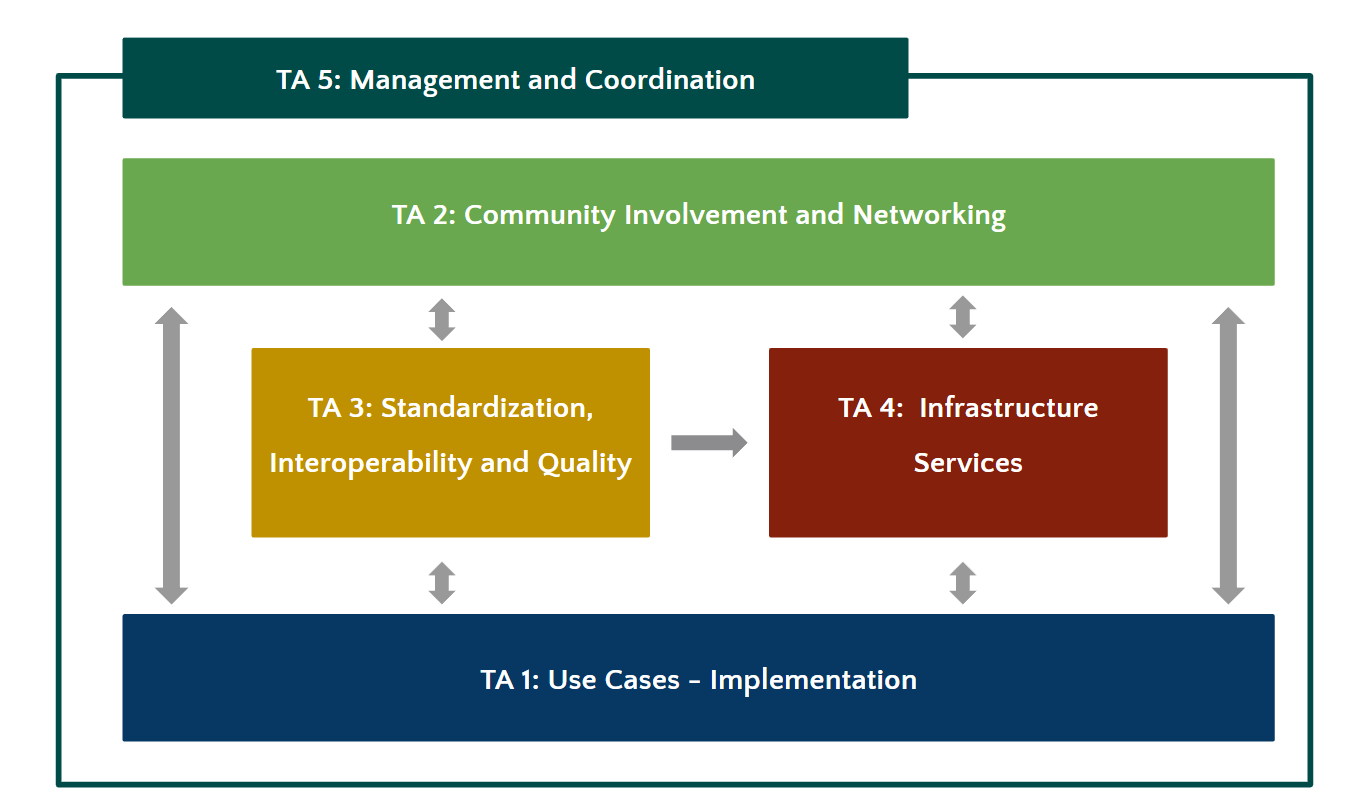
About us
The focus of “FAIRagro” is on agrosystems research data. Agrosystems encompass agricultural landscapes and ecosystems that require an integrated systems perspective to develop sustainable crop production systems, consider interactions between agriculture and the environment (e.g., plants, soil, microbiota), and relationships between scales (space, time, and organisms). Special features of agrosystem research data are that they usually contain geospatial information and are often collected on private land (cropland, pasture). Accordingly, data protection aspects must be taken into account here. The goal of the community-driven consortium is to provide researchers with a FAIR and quality-assured research data management (RDM) for generating, publishing, and accessing research data, to provide innovative and user-friendly RDM services, and to create modern data science methods for advancing agrosystems research. Six flagship use cases from the FAIRagro community were selected to engage different user groups in the areas of crop phenotyping, nutrient and crop protection management, and digital agriculture. These address key RDM challenges and contribute to the implementation of standards and services for selected RDIs. FAIRagro will archive its goals (see below) by working closely with other NFDI consortia and the (inter)national community of data users and providers.
Goals
- Development of a FAIRagro portal, with which we will establish a central access point to our services
- Networking of existing, disciplinary repositories
- Establish a FAIR RDM through a multi-level support system using a Data Steward Service Center and by providing guidance and informational materials
- Address challenges to data quality and the legal security of the provision and use of sensitive data
- Provide an analysis platform with predefined workflows to enable reproducible, integrated data analyses
Task Areas

Task Area 1: Use Cases – Implementation
The objective of TA1 is to address challenges of the agrosystem sciences formulated in six specific use cases (UCs), on which the concepts and services developed in TAs 2-4 for data, metadata harmonization, standardization, data findability and data access will be based. The outputs of the TA1 actions are an important part for training and education to be aligned with TA2. The UCs in TA1 cover a wide range of agrosystem research questions outlined above considering the scales: genes, plants, crop trial, field, and region.
Task Area 2: Community Involvement and Networking
TA2 stands for FAIRagro’s community-driven approach of gathering, engaging, training and educating, and supporting our community. A special characteristic of the agrosystem research community is its distribution over many disciplines, institutions and organizations. Agrosystem research also includes different stakeholders (e.g., consultants, breeders, farmers, policy makers), and is linked to other domains such as plant, environmental, biodiversity and earth sciences. TA2 interacts with the community by bundling ideas, needs, support requests, and feedback and providing training.
Task Area 3: Standardization, Interoperability and Quality
The aim of TA3 is to facilitate reuse, quality screening and annotation of research data. TA3 will consolidate the FAIR data designs of the involved research infrastructures by guiding stakeholders towards FAIR standards, improving the interoperability of involved vocabularies and ontologies, establishing metadata models and providing publication guidelines for the various types of FAIRagro data to ensure findability and reusability. The consortium will extend schema.org, establish data quality metrics based on an application matrix and develop a legal framework and compile on this basis all outputs of TA3 into actionable policies and legal metadata standards for improved reusability.
Task Area 4: Infrastructure Services
Based on the agrosystem domain, the demands formulated by the UCs (TA1), and the standards defined in TA3, TA4 implements the necessary components and infrastructure services of the federated RDM along a FAIR enabled research data lifecycle, which will be made accessible via the FAIRagro Portal. The consortium will provide and implement central FAIRagro services, interlink existing data repositories. It will provide a searchable inventory of services and data to improve findability. A framework for reusable data integration workflows to feature use case specific, cloud enabled analysis workflows will be implemented. Furthermore, TA4 is responsible for ensuring the technical compatibility and potential adoption of NFDI’s cross-cutting infrastructure services, as coordinated in NFDI section Common Infrastructures.
Task Area 5: Management and Coordination
TA5 is responsible for the coordination and management of the consortium. TA5 will initiate and coordinate actions to sustain the achievements of FAIRagro. TA5 will organize the day-to-day business of FAIRagro, manage the consortium’s finances, and ensure compliance with funding conditions. TA5 is in charge of organizing periodic reports and FAIRagro plenary events. Actions will be taken to develop FAIRagro in a sustainable, long-lasting institution beyond the NFDI funding phase and to coordinate communication and relations between FAIRagro, NFDI and relevant national and international RDM initiatives.
Use Cases
- Use case 1: Utilising the interactions between genotype, location, year and management for sustainable plant production; Link
- Use case 2: Evaluation of trade-offs for optimal nitrogen management in plants; Link
- Use case 3: Optimisation of pest and disease data to promote integrated pest management; Link
- Use case 4: Learning from incomplete data; Link
- Use case 5: Non-invasive phenotyping with autonomous robots; Link
- Use case 6: Automated data flows for plant models; Link

Prof. Dr. Frank Ewert
Speaker of the consortium
(Co-)applicant institutions and (co-)speakers
- Prof. Dr. Senthold Asseng (Technische Universität München)
- Dr. Til Feike (Julius Kühn-Institut, Bundesforschungsinstitut für Kulturpflanzen, JKI)
- Prof. Dr. Jochen C. Reif (Leibniz-Institut für Pflanzengenetik und Kulturpflanzenforschung, IPK)
- Birte Lindstädt (Informationszentrum Lebenswissenschaften, ZB MED)
- Prof. Dr. Franziska Boehm (FIZ Karlsruhe – Leibniz-Institut für Informationsinfrastruktur)
- Prof. Dr. Jan-Henrik Haunert (Rheinische Friedrich-Wilhelms-Universität Bonn)
- Daniel Martini (Kuratorium für Technik und Bauwesen in der Landwirtschaft, KTBL)
- Prof. Dr. Juliane Fluck (Informationszentrum Lebenswissenschaften, ZB MED)
- Dr. Matthias Lange (Leibniz-Institut für Pflanzengenetik und Kulturpflanzenforschung, IPK)
- Prof. Dr. Björn Usadel (Forschungszentrum Jülich, FZJ)
- Dr. Xenia Specka (Leibniz-Zentrum für Agrarlandschaftsforschung, ZALF)
- Dr. Ulrike Stahl (Julius Kühn-Institut, Bundesforschungsinstitut für Kulturpflanzen, JKI)
- Dr. Harald von Waldow (Thünen Institut)
- Dr. Claus Weiland (Senckenberg Gesellschaft für Naturforschung, SGN)

Leibniz Centre for Agricultural Landscape Research (ZALF)
Applicant institution
Participating Institutions
- Leibniz-Institut für Agrartechnik und Bioökonomie (ATB)
- Universität Bielefeld (BLU)
- Generaldirektion der Staatlichen Archive Bayerns
- Prof. Dr. Anna Maria Häring, Deutsche Agrarforschungsallianz (DAFA)
- Deutsches Biomasseforschungszentrum gGmbH (DBFZ)
- Deutsche Bodenkundliche Gesellschaft (DBG)
- Deutsche Phytomedizinische Gesellschaft (DPG)
- Deutscher Wetterdienst (DWD)
- Georg-August Universität Göttingen (GAUG)
- Gesellschaft für Pflanzenbauwissenschaften (GPW)
- Hochschule Weihenstephan-Triesdorf (HSWT)
- Humboldt-Universität zu Berlin
- Leibniz-Institut für Gemüse- und Zierpflanzenbau (IGZ) e.V.
- Dr. Manfred Röhrig, Informationssystem für die integrierte Pflanzenproduktion (ISIP e.V.)
- Bayerische Landesanstalt für Landwirtschaft (LfL)
- Geschäftsstelle Think Tank Digitalisierung am Thünen Institut (TTT)
- Helmholtz-Zentrum für Umweltforschung (UFZ)
- Universität Hohenheim (UHOH)
- Universität Rostock
- Verbundzentrale des GBV (VZG)
- Zentralstelle der Länder für EDV-gestützte Entscheidungshilfen und Programme im Pflanzenschutz (ZEPP)

Prof. Dr. Frank Ewert
Speaker of the consortium

Leibniz Centre for Agricultural Landscape Research (ZALF)
Applicant institution
(Co-)applicant institutions and (co-)speakers
- Prof. Dr. Senthold Asseng (Technische Universität München)
- Dr. Til Feike (Julius Kühn-Institut, Bundesforschungsinstitut für Kulturpflanzen, JKI)
- Prof. Dr. Jochen C. Reif (Leibniz-Institut für Pflanzengenetik und Kulturpflanzenforschung, IPK)
- Birte Lindstädt (Informationszentrum Lebenswissenschaften, ZB MED)
- Prof. Dr. Franziska Boehm (FIZ Karlsruhe – Leibniz-Institut für Informationsinfrastruktur)
- Prof. Dr. Jan-Henrik Haunert (Rheinische Friedrich-Wilhelms-Universität Bonn)
- Daniel Martini (Kuratorium für Technik und Bauwesen in der Landwirtschaft, KTBL)
- Prof. Dr. Juliane Fluck (Informationszentrum Lebenswissenschaften, ZB MED)
- Dr. Matthias Lange (Leibniz-Institut für Pflanzengenetik und Kulturpflanzenforschung, IPK)
- Prof. Dr. Björn Usadel (Forschungszentrum Jülich, FZJ)
- Dr. Xenia Specka (Leibniz-Zentrum für Agrarlandschaftsforschung, ZALF)
- Dr. Ulrike Stahl (Julius Kühn-Institut, Bundesforschungsinstitut für Kulturpflanzen, JKI)
- Dr. Harald von Waldow (Thünen Institut)
- Dr. Claus Weiland (Senckenberg Gesellschaft für Naturforschung, SGN)
Participating Institutions
- Leibniz-Institut für Agrartechnik und Bioökonomie (ATB)
- Universität Bielefeld (BLU)
- Generaldirektion der Staatlichen Archive Bayerns
- Prof. Dr. Anna Maria Häring, Deutsche Agrarforschungsallianz (DAFA)
- Deutsches Biomasseforschungszentrum gGmbH (DBFZ)
- Deutsche Bodenkundliche Gesellschaft (DBG)
- Deutsche Phytomedizinische Gesellschaft (DPG)
- Deutscher Wetterdienst (DWD)
- Georg-August Universität Göttingen (GAUG)
- Gesellschaft für Pflanzenbauwissenschaften (GPW)
- Hochschule Weihenstephan-Triesdorf (HSWT)
- Humboldt-Universität zu Berlin
- Leibniz-Institut für Gemüse- und Zierpflanzenbau (IGZ) e.V.
- Dr. Manfred Röhrig, Informationssystem für die integrierte Pflanzenproduktion (ISIP e.V.)
- Bayerische Landesanstalt für Landwirtschaft (LfL)
- Geschäftsstelle Think Tank Digitalisierung am Thünen Institut (TTT)
- Helmholtz-Zentrum für Umweltforschung (UFZ)
- Universität Hohenheim (UHOH)
- Universität Rostock
- Verbundzentrale des GBV (VZG)
- Zentralstelle der Länder für EDV-gestützte Entscheidungshilfen und Programme im Pflanzenschutz (ZEPP)